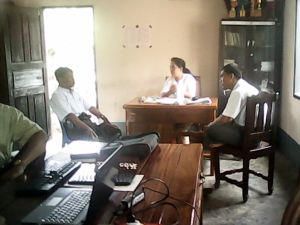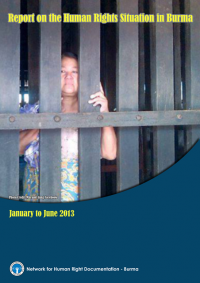Posts Tagged ‘Taxation’ (11 found)
Hpa-an Situation Update: Hlaingbwe and Paingkyon townships, March to May 2016
This Situation Update describes events occurring in Hlaingbwe and Paingkyon townships, Hpa-an District between March and May 2016, including the building of stupas, road construction, taxation and healthcare […]
• • •TPP Tax Payers Decry Unjust Taxation
 Last Saturday, Nov. 23, locals gathered in quarter 3 of Three Pagodas Pass (TPP) on the Thai-Burmese border to protest against alleged unjust taxation.
Last Saturday, Nov. 23, locals gathered in quarter 3 of Three Pagodas Pass (TPP) on the Thai-Burmese border to protest against alleged unjust taxation.
At around 9:00 AM more than 10 TPP tax-payers publicly opposed Daw San San Aye, the head of Kyarinnseikkyi township [Karen State] revenue department, as she was meeting with politicians, local authorities and quarter administrators […]
Report on the Human Rights Situation in Burma (January 2013 – June 2013)
 Over the six months from January to June 2013, ND-Burma documented 147 human rights violations across Burma. These violations occurred in areas of armed conflict but also in areas covered by ceasefires. Each violation is a specific incident, but it may involve any number of victims, from one victim of killing, to forced labor involving many victims, to the forced displacement of an entire village. ND-Burma’s findings demonstrate that, despite progress in reaching ceasefire agreements with non-state armed groups, the government has made little progress protecting the human rights of its citizens. Furthermore, continued arrests of human rights defenders demonstrate that the government is not serious about working with civil society to protect human rights […]
Over the six months from January to June 2013, ND-Burma documented 147 human rights violations across Burma. These violations occurred in areas of armed conflict but also in areas covered by ceasefires. Each violation is a specific incident, but it may involve any number of victims, from one victim of killing, to forced labor involving many victims, to the forced displacement of an entire village. ND-Burma’s findings demonstrate that, despite progress in reaching ceasefire agreements with non-state armed groups, the government has made little progress protecting the human rights of its citizens. Furthermore, continued arrests of human rights defenders demonstrate that the government is not serious about working with civil society to protect human rights […]
ND-Burma Report Documents On-Going Human Rights Abuse in Burma
The Network for Human Rights Documentation – Burma (ND-Burma) has released a periodic report documenting the human rights situation in Burma during the period of January – June 2013. The report documents 147 cases of human rights violations committed by the government and military throughout Burma […]
• • •ND-Burma Releases Periodic Report on the Human Rights Situation in Burma
The Network for Human Rights Documentation – Burma (ND-Burma) today released its latest Periodic Report documenting human rights violations in Burma from January to July of this year.
Over this period, ND-Burma has documented a total of 352 human rights violations. In the areas where cases were gathered, forced labor, confiscation or destruction of property, torture and inhumane or degrading treatment are among the most prevalent human rights violations […]
• • •Supporting local responses to extractive abuse: Commentary on the ND-Burma report Hidden Impact
Eighteen years of KHRG field research indicates that regular extractive abuses by the SPDC Army and NSAGs threaten local livelihoods and are a fundamental human rights concern for villagers throughout eastern Burma. These abuses appear to be the product of the established SPDC Army and NSAG practice of supporting military units via extraction of significant material and labour resources from the local civilian population, enforced by implicit or explicit threats of violence. These findings were recently affirmed by ND-Burma, which last week released a report documenting the prevalence and impact of arbitrary taxation for communities across Burma. This commentary is designed to support ND-Burma’s report […]
• • •New report reveals ‘The Hidden Impact of Burma’s Arbitrary and Corrupt Taxation’
The Network for Human Rights Documentation-Burma (ND-Burma) released its first report, “We have to give them so much that our stomachs are empty of food: The Hidden Impact of Burma’s Arbitrary and Corrupt Taxation.” Based on 342 interviews, the report reveals how widespread, arbitrary taxation damages the country’s economy, exacerbates poverty, and contributes to the ongoing and systematic violation of the people’s most basic right to an adequate standard of living, housing, and education […]
• • •Media Advisory: Launch of ND-Burma’s Report “The Hidden Impact of Burma’s Arbitrary and Corrupt Taxation”
The Network for Human Rights Documentation – Burma (ND-Burma) will hold a press conference to launch its new report “The Hidden Impact of Burma’s Arbitrary and Corrupt Taxation.” ND Burma, through meticulous research and documentation, reveals the military regime’s corrupt and cruel system of taxation and the devastating impact this has on the people of Burma […]
• • •The Hidden Impact of Burma’s Arbitrary and Corrupt Taxation
[…]The system of taxation and extortion impacts on the people of Burma’s basic human rights by violating their right to an adequate standard of living, right to development, property rights, right to education and in the forced labour they are subjected to. The report aims to inform the international community about these practices committed by the regime and the immense negative impact it creates on the people of Burma. It also urges accountability and change.[…]
• • •Abuse between borders: vulnerability for Burmese workers deported from Thailand
The Royal Thai Government appears poised to deport as many as 1.4 million workers that fail to complete “nationality verification” procedures by the end of February 2010. The majority of these workers are Burmese. Based upon extensive research conducted by KHRG and other organisations, it is likely that many of these workers came to Thailand […]
• • •








 All posts
All posts